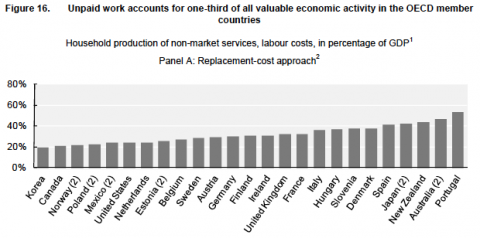Home Work, GDP, and Family Values: It’s Nice to be Validated
A while back I put together a rough calc estimating what our country’s “home-work” is worth as a share of GDP, based on the idea that such work is production, and that it has every bit as much value to our lives as work that we get paid for.
By that estimate (based on the BLS American Time Use Survey), adding the value of home work performed at the median wage would increase our measured GDP by 33%.
It turns out that that estimate was pretty good. Nancy Folbre points to an article in this month’s Survey of Current Business (PDF) that comes to quite similar conclusions:
inclusion raises the level of G.D.P. 39 percent in 1965 and 25.7 percent in 2010.
I also surmised that since Europeans work less hours than Americans (we work four more weeks every year than they do), they would have more time for unpaid work, so the contribution of such work to GDP would be higher in EU countries. Following the data trail back from the SCB piece led me to Cooking, Caring and Volunteering: Unpaid Work Around the World by Veerle Miranda, based on the Multinational Time Use Study. We find therein:

With the exception of Norway (where total GDP is greatly reliant on oil revenues), the European countries do indeed range well up the scale from the U.S.
As I said in that previous post:
Cross-posted at Asymptosis.

would such a calc apply to third world countries where a large portion of the population is enraged in unremunerated sustenance agriculture & similar activities? some of them put in 16 hour days & never see a dime…
if so, much of the planet’s GDP is unreported…
This is why they should be taxing homework.
http://rppe.org/the-case-for-taxing-the-family-garden/
http://rppe.org/the-economic-case-for-taxing-home-cooking/
To be read with tongue place firmly in cheek.